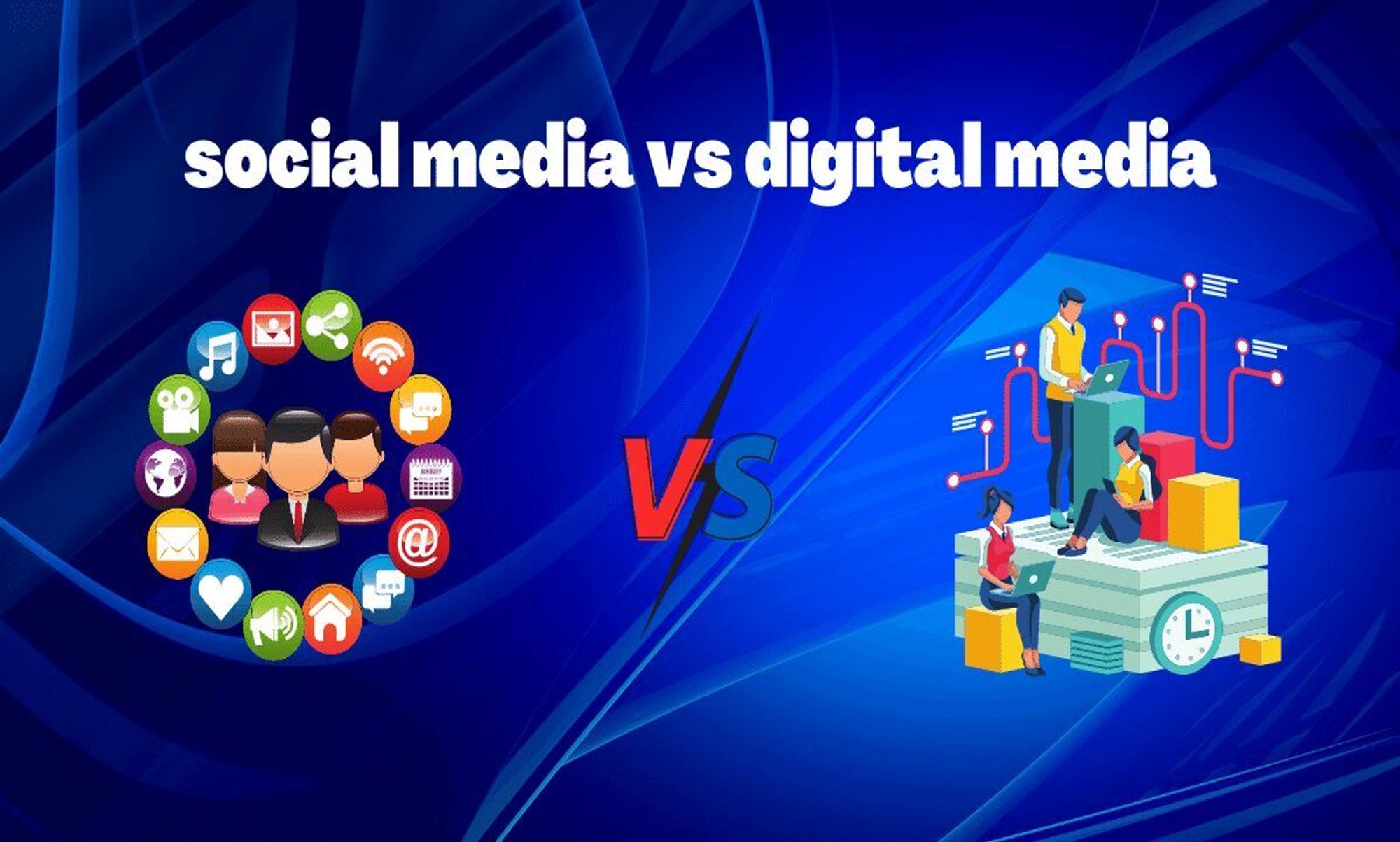
Digital Marketing vs. Social Media Marketing: What is the Difference?
Digital Marketing vs. Social Media Marketing: What is the Difference?
For many people, social media and digital marketing appear to be the same thing. Some believe that because they’re advertising on social media channels, they’re also engaged in digital marketing, but this isn’t the case.
Digital marketing is an umbrella term that refers to all kinds of marketing strategies that a business can execute digitally. Social media marketing is merely one such channel used for digital marketing.
Every experienced businessman knows that to reach their customers, they must go to them. More than 50% of the population is active on various social networks, and according to a 2022 survey by Upcity, 56% of small businesses have chosen to put their focus on social media. The majority of companies utilize specific social media platforms to connect with clients and increase sales, as well as promote the products or services they offer. Although social media marketing is an important aspect of digital media marketing, you don’t have to strictly choose one over any other.
Effective internet marketing is specific and focused. There is no need for every business to implement every possible marketing method. Digital marketing experts understand that they can get a faster and quicker response from social networks in comparison to other types of internet marketing channels. This is why most companies incorporate it into their larger digital marketing strategy to maximize the ROI.
Digital Marketing or Social Media Marketing Campaign?
Every type of marketing campaign is a planned series of actions and procedures designed to advertise a particular product, service, or even a company. Several online marketing channels and strategies are utilized and coordinated to achieve the goals of marketing, regardless of the kind of campaign. Every marketing campaign should be able to demonstrate specific results.
The ultimate goal is always to boost sales, but that’s not the only goal of marketing via digital media. Some campaigns concentrate on increasing traffic to websites and others aim to increase conversion rate. The goal-setting process is a key factor that will influence the contents of your digital marketing campaigns and increase the success that you can achieve with your advertising.
The distinction between digital marketing and social media marketing campaigns could be summarized in the following way:
1. Digital Marketing Campaign
The purpose of digital marketing is to use various internet channels to increase profits and sales, increase brand awareness and customer loyalty, and add value to a brand. Digital marketers typically evaluate a digital marketing plan to measure the effectiveness of their marketing, as well as make adjustments based on real-time information. SEO, search engine optimization and content creation tools, Google Ads, website analytics, and calendars for content are just a few tools utilized when it comes to marketing via digital channels. A digital marketing strategy encompasses the following:
- Design and development of websites
- SEO or Search Engine Optimization
- Organic and paid-for advertising
- Multiple content mediums across different platforms
- Marketing content
- Marketing through affiliates
- Native advertising
- Email marketing
- Analytics
- Social media marketing
Tips for digital marketing: Whether you’re publishing a pay-per-click advertisement or releasing a brand new video, you need to understand the buyer’s journey and the best strategies to employ in each step of the process. However smart your ads or content marketing are, if they’re not put in front of your target audience at the right time, they won’t produce the results you’re seeking.
2. Social Media Marketing Campaign
Social media marketing is focused on social media channels such as Facebook, Twitter, Pinterest, YouTube, TikTok, Snapchat, LinkedIn, and others. The fundamentals of digital marketing are the same, they’re just applied to social media. Marketers select channels carefully to best reflect the company’s image, ensure the highest visibility, and appeal to those who are most likely to be interested in the brand’s message. Social media is a marketing plan that covers a lot, but isn’t limited by the following elements:
- Customer engagement is a key element of several digital marketing channels
- Analytics of conversion and follower analytics
- Marketing via Influencers
- Marketing that is organic and paid for
- Planning and publishing content and publishing
- Participation of the community through direct messages and polls
- Analytics analysis
- Engagement of the community with followers
Social media marketing tip: Social groups and communities are fantastic spots to advertise special offers, content, and services. Communities of internet users who are similar to your own can help build brand recognition and offer valuable insights from customers to enhance your content and strategy.
3. Advantages of Social Media
Understanding your customers’ preferences on social networks and the way they interact online will help you promote your services and products the optimal way through the most suitable digital channels. TikTok, LinkedIn, Facebook, Instagram, and Twitter are all available to you with a variety of digital marketing advantages:
- The ability to build brand awareness through social media can be used for target marketing, with the advantage of placing your business in front of potential customers, regardless of whether you are in a niche.
- Lead generation and sales: The use of social media for marketing and lead generation is an advanced method of expanding your online marketing capabilities and generating more leads via ads that are either organic or paid (67% of consumers who shop online have bought an item after seeing it advertised on social networks.)
- Improved SEO Marketing campaigns on social media do not affect the rankings of search engines, however, they could affect the search SEO (Search Engine Optimization) by increasing traffic to websites which increases brand authority and recognition, as well as improving local SEO.
- Retargeting: You can re engage potential customers or leads if they’ve left your site without getting further into the buyer’s funnel, thus increasing the chances of conversion.
- Cost-effective: In comparison to traditional marketing, the social media marketing method offers greater control over budget expenditure because the data analytics available for social media are clear and precise.
Digital marketing is much more extensive than marketing via social media. It includes pay-per-click ads and email marketing, as well as advertisements and digital campaigns, branding, SEO, and all other forms of marketing.
Even if you’re conducting social media campaigns, it does not mean you’re completely engaged in digital marketing. However, if you can be sure that it will produce the outcomes you require and meets your marketing requirements, it can be enough.
What Should Your Digital Marketing Strategy Be?
There is no need to incorporate all digital marketing channels into your marketing strategy. However, knowing the role social media plays in your marketing can result in an approach that increases customer engagement and provides more organic leads. If you’re busy, why not leave it to professionals?
A skilled digital marketer can assist you in creating an individual digital marketing plan that utilizes the most suitable digital marketing channels as well as social media platforms that fit your target audience, your business, and your budget.

